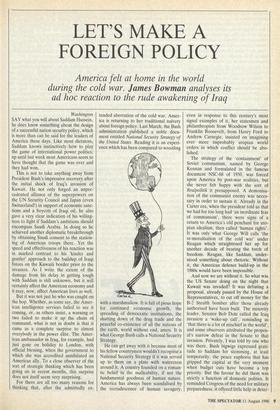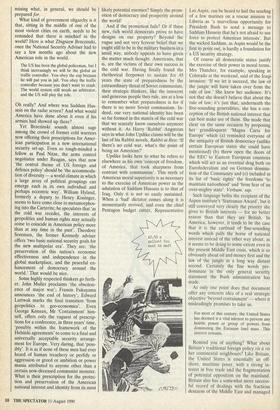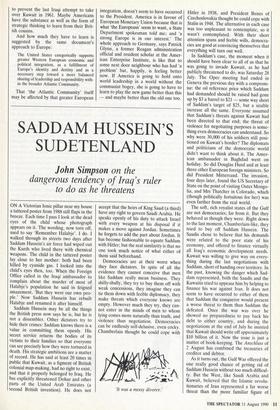LET'S MAKE A FOREIGN POLICY
America felt at home in the world ad hoc reaction to the rude awakening of Iraq
Washington SAY what you will about Saddam Hussein, he does know something about the design of a successful nation security policy, which is more than can be said for the leaders of America these days. Like most dictators, Saddam knows instinctively how to play the game of international power politics; up until last week most Americans seem to have thought that the game was over and they had won.
This is not to take anything away from
President Bush's impressive recovery after the initial shock of Iraq's invasion of Kuwait. He not only forged an unpre- cedented alliance of the superpowers on the UN Security Council and Japan (even Switzerland!) in support of economic sanc- tions and a boycott of Iraqi oil, he also gave a very clear indication of his willing- ness to fight if Saddam's ambitions should encompass Saudi Arabia. In doing so he achieved another diplomatic breakthrough by obtaining Saudi consent, to the station- ing of American troops there. Yet the speed and effectiveness of his reaction was in marked contrast to his 'kinder and gentler' approach to the buildup of Iraqi forces on the Kuwaiti border prior to the invasion. As I write the extent of the damage from his delay in getting tough with Saddam is still unknown, but it will certainly affect the American economy and it may, now, affect American lives as well.
But it was not just he who was caught on the hop. Whether, as some say, the Amer- ican intelligence services failed to see it coming, or, as others insist, a warning or two failed to make it up the chain of command, what is not in doubt is that it came as a complete surprise to almost everybody in the power elite. The Amer- ican ambassador in Iraq, for example, had just gone on holiday to London, with official blessing, when the government to which she was accredited annihilated an American ally. To a close observer of the sort of strategic thinking which has been going on in recent months, this surprise does not itself seem very surprising.
For there are all too many reasons for thinking that, after the admittedly ex-
tended aberration of the cold war, Amer- ica is returning to her traditional naivety about foreign policy. Last March, the Bush administration published a noble docu- ment entitled National Security Strategy :of the United States. Reading it is an experi- ence which has been compared to wrestling
with a marshmallow. It is full of pious hope for continued economic growth, the spreading of democratic institutions, the shutting down of the drug trade and the peaceful co-existence of all the nations of the earth, world without end, amen. It is what George Bush calls a National Security Strategy.
He can get away with it because most of his fellow countrymen wouldn't recognise a National Security Strategy if it was served up to them on a plate with watercress around it. A country founded on a roman- tic belief in the malleability, if not the fundamental goodness of human nature. America has always been scandalised by the recrudescence of human savagery; even in response to this century's most signal examples of it, her statesmen and philanthropists from Woodrow Wilson to Franklin Roosevelt, from Henry Ford to Andrew Carnegie, insisted on imagining ever more improbably utopian world orders in which conflict should be abo- lished.
The strategy of the 'containment' of Soviet communism, named by George Kennan and formulated in the famous document NSC-68 of 1950, was forced upon America by post-war realities, but she never felt happy with the sort of Realpolitik it presupposed. A demonisa- tion of the communist enemy was neces- sary in order to sustain it. Already in the Carter era, when the president told us that we had for too long had 'an inordinate fear of communism', there were signs of a return to America's old penchant for uto- pian idealism, then called 'human rights'. It was only what George Will calls 'the re-moralisation of the cold war' under Reagan which straightened her up for another decade of bearing the torch of freedom. Reagan, like Saddam, under- stood something about rhetoric. Without it, the American defence build-up in the 1980s would have been impossible.
And now we are without it. So what was the US Senate doing on the night that Kuwait was invaded? It was debating a proposal, already passed by the House of Representatives, to cut off money for the B-2 Stealth bomber after those already authorised have been built. The minority leader, Senator Bob Dole called the Iraq invasion a `wake-up call', reminding us 'that there is a lot of mischief in the world', and some observers attributed the propos- al's narrow defeat in the Senate to that invasion. Privately, I was told by one who was there, Bush bigwigs expressed grati- tude to Saddam for stemming, at least temporarily, the peace euphoria that has gripped the capital at the very moment when budget cuts have become a top priority. But the favour he did them was strictly a function of domestic politics. It reminded Congress of the need for military preparedness; it offered little help in deter- mining what, in general, we should be prepared for.
What kind of government oligarchy is it that, sitting in the middle of one of the most violent cities on earth, needs to be reminded that there is mischief in the world? Here is what Zbigniew Brzezinski, once the National Security Adviser had to say a few months ago about the new American role in the world.
The US has been the global policeman, but I think increasingly we will be the global air traffic controller. You obey the cop because he will put you in jail. You obey the traffic controller because you don't want to crash. The world system still needs an arbitrator, and the US will play the role.
Oh really? And where was Saddam Hus- sein on the radar screen? And what would America have done about it even if his armies had showed up there?
Yet Brzezinski sounds almost sage among the crowd of former cold warriors now offering their prescriptions for Amer- ican participation in a new international security set-up. Even so tough-minded a fellow as Paul Nitze, the arms control negotiator under Reagan, says that now 'the central theme of US foreign and defence policy' should be 'the accommoda- tion of diversity — a world climate in which a large array of political groupings can emerge each in its own individual and perhaps eccentric way'. William Hyland, formerly a deputy to Henry Kissinger, seems to have come close to metamorphos- ing into the Carterite; he speculates that 'as the cold war recedes, the interests of geopolitics and human rights may actually come to coincide in American policy more than at any time in the past'. Theodore Sorensen, the former Kennedy adviser offers 'two basic national security goals for the new multipolar era'. They are: 'the preservation of this nation's economic effectiveness and independence in the global marketplace, and the peaceful en- hancement of democracy around the world.' That would be nice.
Some highly respected thinkers go furth- er. John Muller proclaims 'the obsolesc- ence of major war'; Francis Fukuyama announces 'the end of history'; Edward Luttwak marks the final transition 'from geopolitics to geo-economics'. Even George Kennan, Mr 'Containment' him- self, offers only the vaguest of prescrip- tions for a conference, in three years' time, 'possibly within the framework of the Helsinki agreements' to come to a final and universally acceptable security arrange- ment for Europe. Very daring, that 'poss- ibly'. It is as if none of these men had ever heard of human treachery or perfidy or aggression or greed or ambition or power mania attributed to anyone other than a certain now-deceased communist monster. What is their prescription for the protec- tion and preservation of the American national interest and identity from its most likely potential enemies? Simply the prom- otion of democracy and prosperity around the world!
And if the promotion fails? Or if these new, rich world democrats prove to have designs on our property? Beyond the vague and not very fervent belief that we ought still to be in the military business in a small way, nobody appears to have given the matter much thought. Americans, that is, are the victims of their own success in the cold war. Having finally found the rhethorical firepower to sustain for 45 years the state of preparedness by the extraordinary threat of Soviet communism, their strategic thinkers, like the innocent and generous people they rule, are at a loss to remember what preparedness is for if there is no more Soviet communism. In- deed, our very national identity has been so far formed in the matrix of the cold war that we scarcely know ourselves anymore without it. As Harry 'Rabbit' Angstrom says in what John Updike claims will be the last of his Rabbit novels, Rabbit at Rest: 'If there's no cold war, what's the point of being an American?'
Updike looks here to what he refers to elsewhere as his own 'concept of freedom, of America, that took sharpness from contrast with communism'. This myth of American moral superiority is as necessary to the exercise of American power as the adulation of Saddam Hussein is to that of Iraq. Only it is not so easily sustained. When a 'bad' dictator comes along it is momentarily revived, and even the chief Pentagon budget cutter, Representative Les Aspin, can be heard to hail the sending of a few marines on a rescue mission to Liberia as 'a marvellous opportunity for President Bush to send a message to Saddam Hussein that he's not afraid to use force to protect American interests'. But the wicked Saddam, as Aspin would be the first to point out, is hardly a foundation for a US security strategy.
Of course all democratic states justify the exercise of their power in moral terms. Mrs Thatcher, for example, speaking in Colorado at the weekend, said of the Iraqi. invasion: 'If we let it succeed, the law of the jungle will have taken over from the rule of law.' She knew her audience. It's not that she doesn't believe that about the rule of law; it's just that, underneath the fine-sounding generalities, she has a con- ception of the British national interest that can best make use of them. She made that clear on the same occasion by proposing her grandiloquent 'Magna Carta for Europe' which (a) reminded everyone of the antiquity of British democracy (unlike certain European states she could have mentioned) (b) threw open the doors of the EEC to Eastern European countries which will act as an eventual drag both on Eurofederalism and on German domina- tion of the Community and (c) included in its list of 'basic rights' the freedoms 'to maintain nationhood' and 'from fear of an over-mighty state'. Verbum. sap.
Such language befits the recipient of the Aspen institute's 'Statesman Award', but it still conveyed very clearly the priority she gives to British interests — for no better reason than that they are British. In America, however, it tends to be the case that it is the cartload of fine-sounding words which pulls the horse of national interest instead of the other .way about, as it seems to be doing to some extent even in the present Middle East crisis, which is so obviously about oil and money first and the law of the jungle in a long way distant second. Certainly the fine words pre- dominate in the only general security statement the Bush administration has made.
At only one point does that document offer any concrete idea of a real strategic objective 'beyond containment' — where it misleadingly promises to take us.
For most of this century. the United States has deemed it a vital interest to prevent any hostile power or group of powers from dominating the Eurasian land mass. This interest remains.
Remind you of anything? What about Britain's traditional foreign policy visa vis her continental neighbours? Like Britain, the United States is essentially an off- shore, maritime poser, with a strong in- terest in free trade and the fragmentation of potential opposition on the mainland. Britain also has a somewhat more success- ful record of dealings with the fractious denizens of the Middle East and managed to prevent the last Iraqi attempt to take over Kuwait in 1961. Maybe Americans have the substance as well as the form of strategic thinking to learn from their Brit- ish cousins.
And how much they have to learn is suggested by the same document's approach to Europe:
The United States categorically supports greater Western European economic and political integration, as a fulfillment of Europe's identity and destiny and as a necessary step toward a more balanced sharing of leadership and responsibility with- in the broader Atlantic Community.
That 'the Atlantic Community' itself may be affected by that greater European integration, doesn't seem to have occurred to the President. America is in favour of European Monetary Union because that is what 'the Europeans' seem to want, a State Department spokesman told me; and 'a strong Europe is in our interest.' The whole approach to Germany, says Patrick Glynn, a former Reagan administration official and resident scholar at the Amer- ican Enterprise Institute, is like that to some next door neighbour who has had 'a problem' but, happily, is feeling better now. If America is going to hold onto world leadership in a world without the communist bogey, she is going to have to learn to play the new game better than this — and maybe better than the old one too.












































 Previous page
Previous page